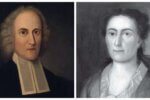Hannah cried out to God for Samuel to be born, and he went on to become the greatest prophet and judge Israel ever knew (see 1 Sam. 1).
Deborah was an illustrious judge and a proven prophetess who delivered Israel from the mighty chariots of Jabin, the oppressing king of Canaan. Another woman, Jael, helped to bring total destruction to Jabin and his leading general, Sisera (see Judges 4-5).
Esther courageously risked her life to save her nation, God’s people, when they were in danger of being exterminated.
Sarah was called “mother of nations” by God Himself (see Gen. 17:16) and is listed among the heroes of the faith in Hebrews 11.
Priscilla and her husband, Aquila, instructed and guided Apollos, who had been preaching less-than-perfect theology (see Acts 18: 24-26). The fact that in most tranlations, Priscilla is listed first in this passage signifies the prominence of her role.
On the shoulders of these women—and countless more down through the ages—rested the fate of cities, tribes and nations.
Pillars of the Early Church
One of the main reasons Christianity spread so rapidly in the early years is because its message restored honor and self-worth to half the world’s population: women. Romans had such a low view of women that some men engaged in sex with other men. Jewish rabbis completely silenced women inside the synagogue, and pagans used them as temple prostitutes.
However, early church leaders dignified women by teaching that in Christ “there is neither male nor female” and we “are all one in Christ Jesus” (Gal. 3:28, NKJV). Women were also given positions of honor and leadership.
Priscilla, for instance, was part of the team that founded the church in Ephesus—site of the greatest power encounter recorded in the book of Acts. She was there, inside the crux of God’s power, when God dethroned Artemis and brought down the demonic socioeconomic structure that had controlled Ephesus.
Throughout the epistles women are unapologetically exalted as pillars of the faith. Paul identified two women as the headwaters of Timothy’s faith: his mother and his grandmother (see 2 Tim. 1:5). In Romans, a letter intended for wide circulation and public reading, Paul praised several women as people of faith and proven ministry (see Rom. 16:1-15).
The first European convert was a woman, Lydia, and hers was the first household to be baptized (see Acts 16:14-15). She was very assertive in her interaction with the apostles: “She begged us, saying, ‘If you have judged me to be faithful to the Lord, come to my house and stay.’ So she persuaded us” (v. 15).
Three centuries later, the driving force behind Constantine’s conversion and the subsequent Christianization of the Roman Empire was another woman, Helena, the emperor’s mother.
Extraordinary Sensitivity
Women have an extraordinary sensitivity to spiritual things. I am not saying that they are more godly than men, but I believe they are definitely more spiritual. This is why Jesus was able to reveal two of the most powerful truths in the gospels to women.
He told Martha that He is the resurrection and the life (see John 11:25-27). To the Samaritan woman Jesus explained that He is the living water (see John 4:7-15). These women were in a state of confusion when Jesus found them, but both were able to hear, understand and believe these profound truths.







Leave a Comment
You must be logged in to post a comment.